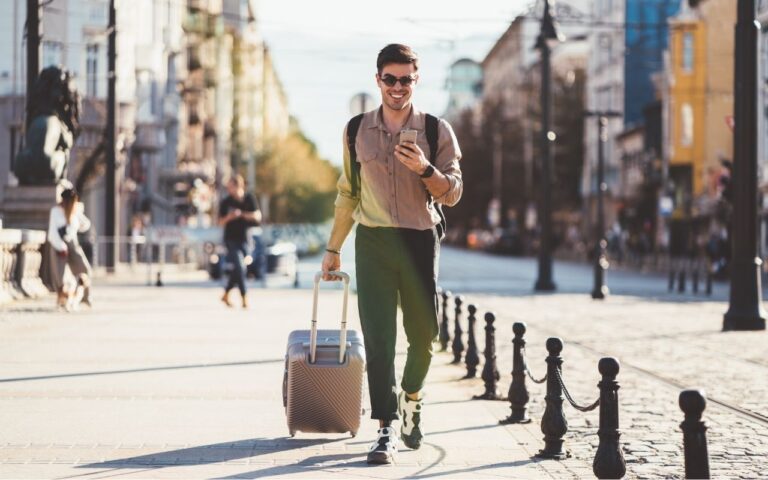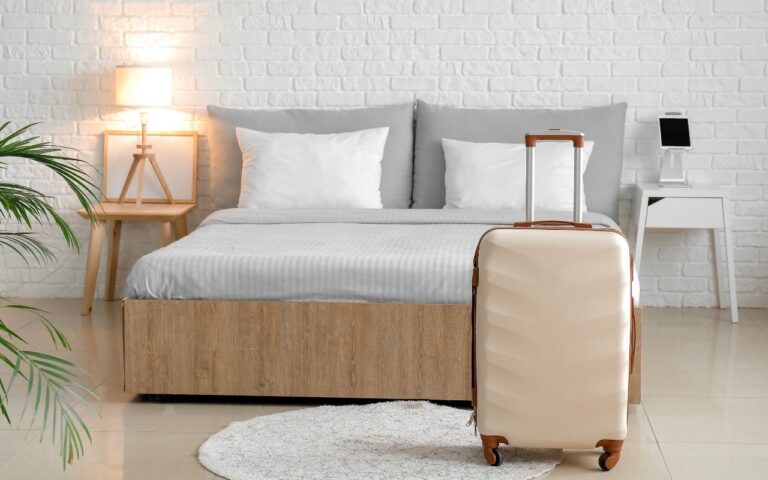Hotel Keyless Entry: The New Hospitality Standard in 2025
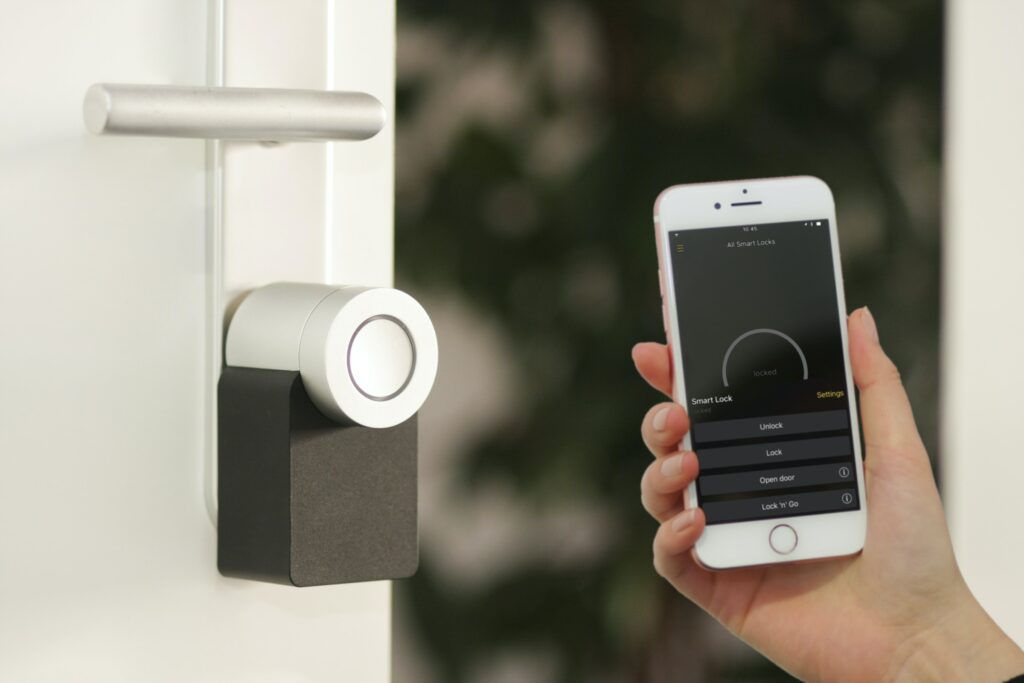
High-end hotel technology—such as automated, keyless entry—used to be seen as limited to big players such as Hilton and Marriott. But now, it has become an industry standard.
And why not? It’s more sanitary, more secure, saves on operating costs, and improves guest satisfaction.
But, despite it being a major hospitality industry trend, switching to a fully keyless operation might sound daunting for some hoteliers.
It’s not just a question of hardware functionality, but also of organizing the logistics, training your team, and syncing things with your current systems.
But with a little know-how and support, it turns out making the switch to tech can be simple and straightforward, regardless of your operation size.
Simplified, agile, and easy-to-install hotel check-in automation means it’s becoming easier and easier for smaller companies to make the shift to digital keyless entry systems—and at Operto we’re committed to helping you join them.
That’s why in this piece, we’ll show you:
- How three big players are using keyless tech to level up their management and guest experience.
- How a smaller, more agile “mom and pop” hotel business is making the system work for them too, on the same scale as the big hitters.
- How to start copying these proven systems in your own business
Mark our words: It’s simple to start providing high-end, super-modern, and satisfying guest services at an accessible cost that works for you and your business, no matter the size. These four inspiring hotel brands show you how.
What are the advantages of using hotel keyless entry?
From the stress of lost or stolen keys and excess staff costs; to simplified, intuitive, and scalable systems that can be managed via a single portal at the touch of a button or swipe of a screen—keyless entry offers a host of benefits to streamline your hotel operations.
And what’s more, a huge 96.4% of hospitality professionals say that their guests now either “expect” or “appreciate” keyless tech.
Requires front desk staff to hand over physical keys on arrival
- No front desk required, saves cost + space
Guests waiting for their keys to check-in
- Guests go straight to room on arrival, no waiting or delay
Risk of losing keys
- Digital keys mean no risk of key loss
Risk of theft of keys from rooms
- Keycodes change with each new stay, reducing security risk
Cost of replacing keys
- Codes digitally created, no extra cost for new codes
Key only works with one door lock
- Works with the best and most secure hotel door locks, including smart locks
Security entry concerns due to stolen or lost keys
- Keycodes can be changed remotely to revoke or change access in case of security risk
Risk of plastic keycards demagnetizing
- No risk for keycodes; codes work even without a smartphone too, with no extra app required
Traditional keys have no connection or guest link to in-room controls
- Digital keys for hotels unlock access to smart devices such as thermostats, AC, and noise monitors, and allow guests to set temperature schedules and similar
Traditional keys cannot be connected to wider management system
- Keyless entry system allows monitoring of occupancy + cleaning, 100% remotely, on a single platform
Traditional keys do not store any extra details for guests or staff
- Keyless entry browser shows extra information about the hotel or amenities near the vacation rental, such as laundry, restaurants, and Wi-Fi password
Only guest or staff with that exact key can access a particular door
- Keyless access system allows everyone to use the platform and be connected, including housekeeping, staff, and guests
Examples of keyless entry hotels paving the way in the industry
You don’t need to have the same operating budget as Marriott or convert to a complete Sonder operating model to be fully tech-enabled—and yet, we can still look to bigger players for inspiration on how they’re providing streamlined, wow-factor experiences to guests via the magic of keyless technology.
The following companies—big and small—are each employing hotel automation entry systems in a creative, inspired way, and optimizing them for their audience, clients, and guest priorities.
Look no further than these businesses for the best inspirational blueprints to copy for your own hotel.
Jurny: Using a hotel keyless entry system to scale despite Covid
A hospitality start-up founded in LA in 2017, Jurny now operates 500 “home from home” units across four countries and eight cities, including Miami, London, Nashville, and Tel Aviv.
As an Operto partner, Jurny offers guests a seamless, digitally-powered stay, enabling them to book, pay, access the building, unlock their unit door, connect to Wi-Fi, and 24/7 customer support, all from their mobile device.
With more than 700,000 guests served, Jurny achieved a record 400% year-over-year growth in 2020, despite the pandemic.
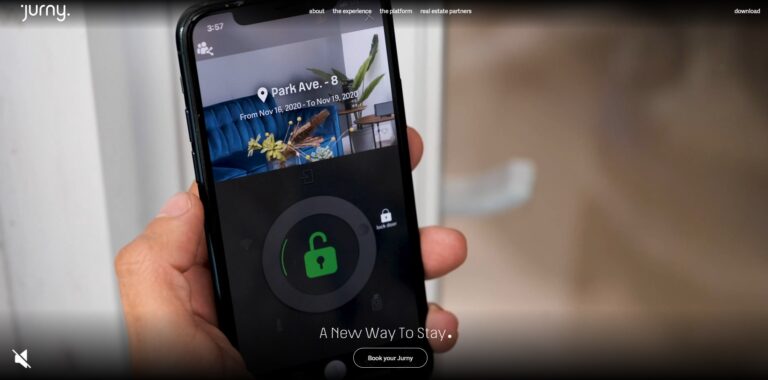
Credit: Jurny.com
Why we should look to them for keyless entry inspiration
Jurny is the ultimate example of a lean tech company that used software to enable it to pivot, thrive, and scale sustainably despite the challenges of Covid.
Because it invested in agile technology rather than buying too many properties too soon, Jurny was able to scale on a budget sustainably over time. This meant it avoided the crash-and-burn seen among many of its competitors during the pandemic, such as the now-defunct Stay Alfred.
Technology has allowed Jurny to successfully build a reputation for reducing operational costs, and its adaptable mobile key for hotels means it can work for a range of types, from major chains to historic properties—such as the 25-unit boutique Hotel Brexton in Baltimore, Maryland—to multi-unit short-term rentals.
As Luca Zambello, co-founder and CEO of Jurny, has said: “The sudden onset of new restrictions and unpredictable nature of the pandemic quickly exposed unsustainable business models and brought to light the importance of a lean, agile organization that can pivot and scale with evolving market demands.”
David Phillips, co-founder and president of Jurny, added: “Triple-digit growth in an unfavorable market underscores the strength of Jurny’s tech-first business model and the effectiveness of its scalable model for hospitality management.
Mint House: Using a keyless hotel entry app for corporate guests
A New York-based company aimed at high-end business travelers, which secured $18m in funding in its latest investment round.
As an Operto customer, it has contactless technology at the heart of its operations, and now runs around 600 units across 12 US cities; including Austin, New York, Detroit, Denver, Philadelphia, and Nashville.
With a 4.7 out of 5 rating for its Nashville Reserve location on Expedia, and one particularly good review describing it as “like a hotel but better”, Mint House certainly appears to be delivering on its big promises to digital nomad hotel guests.
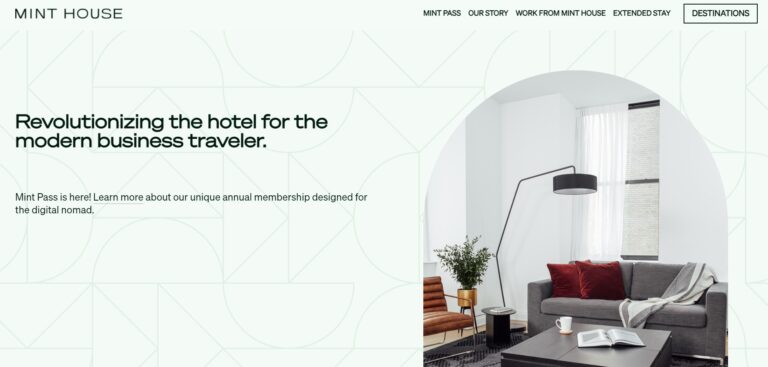
Credit: Minthouse.com
Why we should look to them for keyless hotel entry inspiration
Mint House is inspiring in its unapologetic use of high-end technology to appeal to the similarly high-end business traveler.
The remote working landscape has undeniably shifted post-pandemic, meaning Mint House looks poised to flourish, with a recent report finding that the US digital nomad demographic grew by almost 50% year-on-year in 2020, to nearly 11 million people. And a January PwC study showed that 50% of US employees want to continue working remotely three or more days per week.
Mint House corporate partnerships manager Caroline Rehkow has cited both these studies as central evidence of the company’s aim, saying: “We want to support those travelers. 80% of our guests are working from our units, and since many companies are supporting remote work, the line between business and leisure is blurring.”
As a result, Mint House is working to provide sleek yet cozy home-from-home spaces that use technology to simplify stays and ensure what it calls social distanced, “self-sufficient living”, for this new digital workforce.
The units are specifically designed for fuss-free business and remote work, with the keyless hotel door lock allowing guest room access instantly via mobile app.
Guests also have mobile access to 24/7 digital concierge, thermostat control, toiletries, artisan coffee, pre-stocked fridges, in-house laundry, high-speed Wi-Fi, and flexible desk space, to ensure “low-touch”, “no contact”, super-productive, stress-free travel.
The new Mint Pass $250 annual membership takes this even further, giving guests year-round access to Mint House properties at a 30% discount and flexible cancellation, with extra rewards for members who stay in five different cities or more.
Will Lucas, CEO and founder of Mint House, has said: “It’s always been our mission to fundamentally improve the lives of road warriors who are tired of the legacy, box-like hotel, whether they were staying for two nights, two weeks or two months.
“Over the course of the pandemic, Mint House’s model has proven to be ahead of its time as our tech-driven concept offers a safe, reliable option.”
Annex Hotel: Wow-factor hotel room keyless entry in Toronto
From its founding in 2018, Toronto-based Hotel Annex set out to create an “anti-hotel” using high-tech, low-touch tech to appeal to young, international travelers and business guests.
Its three owners come from backgrounds including private finance, start-ups, tech, and real estate, and deliberately set out to “do things differently”, before contactless and mobile keyless entry was so widespread.
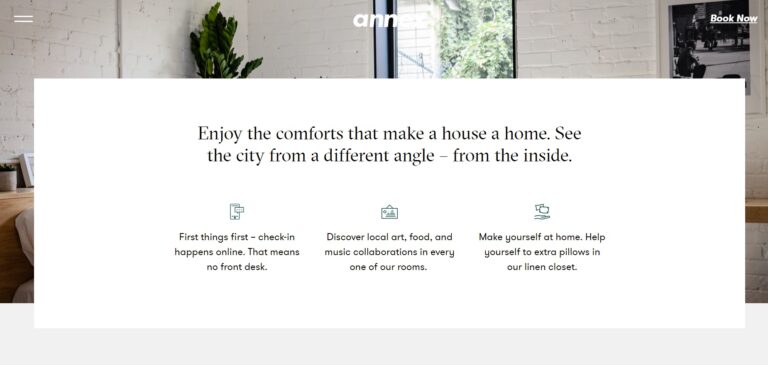
Credit: theannex.com
Why we should look to them for keyless hotel entry inspiration
Annex’s priority is to offer a hotel experience that enables guests to feel at home, and truly enjoy the city they’re staying in—with zero fuss or stress, and it was way ahead of the curve when it comes to technology.
As an Operto partner, it now uses tech to provide a streamlined hotel key entry solution with no front desk needed. Guests can also text staff for insider tips and local knowledge, while the hotel spaces themselves feature local art, food, and music collaborations.
The Annex uses technology as just another seamless part of its modern, city-central experience, and includes keyless mobile key check-in on a list of features along with in-room iPad Pros with Netflix, fast Wi-Fi, laptop-friendly workspaces, a back patio, in-room thermostats, hairdryers, bath products, snacks, in-room burgers, a lobby bar, and a pet-friendly room policy.
Beyond the guests, this technology-first approach has streamlined operations and reduced costs, with just one staff member per 24 rooms, and an annual saving of more than $122,000 on front desk staff.
General manager Ryan Killeen told us:
“Today everyone is on their smart devices and it really makes sense for that channel to be how you communicate access, how you interact with guest requests and allow them to discover something new. We want them to feel like they are interacting with us as locals who are giving real local suggestions for their stay. Operto has been fantastic for the hotel. When guests arrive all they have to do is place their palm over a keypad and enter a code and they’re given access to the room. It’s always fun to watch people when they first realize how simple it is.”
About the Wyman Hotel
Located at 9,318 feet above sea level in the 600-inhabitant “Wild West” town of Silverton, Colorado, the Wyman Hotel is not the first place you might expect to find high-end technology.
Yet, opened in 2019 in a building dating back to 1902, the 15-bedroom haven combines back-to-nature beauty with what its owners, couple Shane Fuhrman and Haley Morgan, call “the comforts and amenities of an urban boutique hotel”.
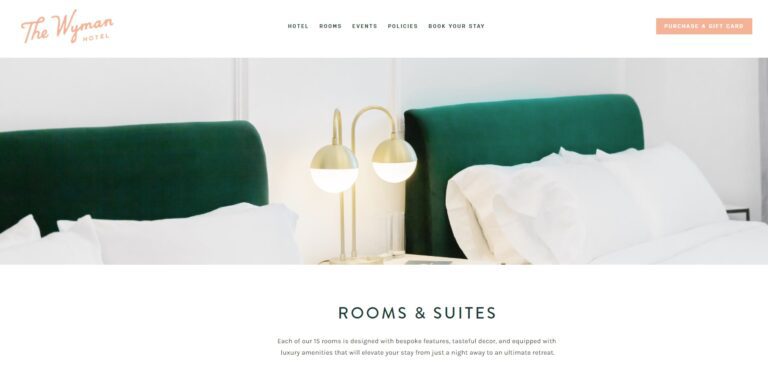
Credit: thewyman.com
Why we should look to them for keyless hotel entry inspiration
This “mom and pop” boutique business proves that keyless entry technology is accessible even for operations without millions of dollars of funding, and even for historic hotels found an apparent world away from urban crashpads.
As an Operto customer, the Wyman has “DIY-ed” the same kind of tech-centric, modern operating model as the bigger players on this list—through a combination of Cloudbeds property management system with Operto—even without being VC-backed or having hundreds of properties, like Jurny or Mint House.
Beyond keyless and online check-in options, it also offers four Tesla charging stations, along with fiber-optic Wi-Fi and Bluetooth speakers (along with low-tech options such as books, cards, and games, as well as a lobby bar).
Designed with “artists, creatives, and adventurers” in mind, the Wyman manages to combine the rugged outdoor offerings of cowboy country (think mountain biking, rock climbing, hiking, and skiing) with the blush pink and deep teal velvet furnishings last seen on the average Millennial’s favorite Instagram account.
Combining cozy-yet-chic design and rich historical charm with discreet and streamlined technology, this hotel offers inspirational proof, if any were needed, that keyless doesn’t have to mean soulless.
As Furman said: “I had been traveling to ski towns for most of my life and had never seen the type of hospitality that was happening in northeast New York. So we thought it was an interesting opportunity to be ahead of the curve in places that typically lag behind.
“And I loved the idea of curating an experience for people. I don’t want to stress a guest out with unnecessary friction and antiquated room keys. I like to think, how can we curate the most relaxing and satisfying experience for a guest from start to finish, thinking about all of the five senses?”
And, at a time when many in the hotel industry have been struggling to stay open at all, the Wyman has capitalized on its lean operating model and unique location to thrive. It has now just acquired a second site, in Durango; and will be bringing 28 keyless locks online in the next few months.
“Even before Covid, we designed it contact-free, and all of our doors have keypads. We rely heavily on the Operto integration, which allows us to function in a very stable way from a business perspective. And we can control the lights, heat, and music, and access control, from our phones in real-time, as well as security cameras too. We can essentially run the whole building with just our cleaning staff and one manager during slow times, and staff up when it’s busy [to five staff].”
The Bottom Line
It’s clear from this impressive list of inspirational hotels that technology can work brilliantly to reduce costs, drive up revenue and impress guests—no matter the size, location, or style of your business.
Even the daunting aspects of switching your hotel to a new technology model are less so when working with a partner such as Operto—which integrates with trusted PMS platforms such as Mews—who can help improve your set-up whether your business is a major international player or a historic boutique site nestled in the mountains.
As co-owner of the Wyman, Shane Furman explains: “The lock system we had on 12 of our rooms was pretty annoying to use, and we didn’t feel that [our previous operator] was helping us before we switched over.”
“But when we started working with Operto, we brought four more rooms online and now use a different lock, and they’ve been great.”
There’s no doubt these hotels are inspiring, but now you know what’s possible—what’s stopping your hotel from making the change?
In Furman’s own words: “Do it yesterday. It’ll be the best decision you’ve made.”
Ready to see Operto in action?
See why thousands of hospitality businesses trust our solutions to deliver exceptional guest experiences.
Latest News
Stay informed and inspired: discover the freshest blog articles, latest updates, and breaking news.


